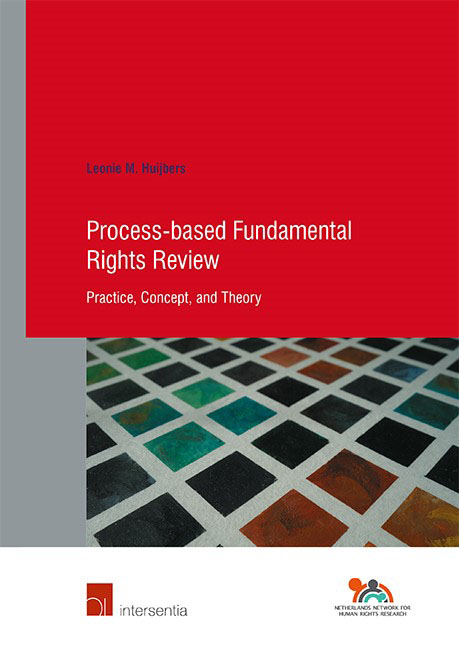Book contents
- Frontmatter
- Acknowledgments
- Contents
- List of Abbreviations
- INTRODUCTION
- PART I THE PRACTICE OF PROCESS-BASED FUNDAMENTAL RIGHTS REVIEW
- PART II THE CONCEPT OF PROCESS-BASED FUNDAMENTAL RIGHTS REVIEW
- PART III THE THEORY ON PROCESS-BASED FUNDAMENTAL RIGHTS REVIEW
- CONCLUSION
- Addendum: Questions for ECtHR Judges
- Summary
- Samenvatting
- Bibliography
- Official Documents
- Case-Law (by Jurisdiction)
- Case-Law (by Name)
- Curriculum vitae
- Human Rights Research Series
- Index
Chapter 3 - Process-based Fundamental Rights Review of Administrative Procedures
Published online by Cambridge University Press: 11 November 2021
- Frontmatter
- Acknowledgments
- Contents
- List of Abbreviations
- INTRODUCTION
- PART I THE PRACTICE OF PROCESS-BASED FUNDAMENTAL RIGHTS REVIEW
- PART II THE CONCEPT OF PROCESS-BASED FUNDAMENTAL RIGHTS REVIEW
- PART III THE THEORY ON PROCESS-BASED FUNDAMENTAL RIGHTS REVIEW
- CONCLUSION
- Addendum: Questions for ECtHR Judges
- Summary
- Samenvatting
- Bibliography
- Official Documents
- Case-Law (by Jurisdiction)
- Case-Law (by Name)
- Curriculum vitae
- Human Rights Research Series
- Index
Summary
INTRODUCTION
Procedural reasoning is a central part of judicial review of administrative actions. In this context, ‘most successful judicial review claims success on the basis that the decisionmaker has done something in the wrong way, rather than the decision-maker has done something that is, all things considered, unjustifiable’. The courts’ role therefore lies primarily (or solely) in checking the administrative decision-making procedure, rather than in supplementing administrative decisions with their own substantive views. This means that courts assess the quality of the administrative process by determining inter alia whether executive bodies gathered the required information, whether they acted within their competences (the principle of ultra vires), whether they did not exceed their discretion, and whether they heard the parties involved. Procedural approaches are the starting point not just in national administrative law, but also at the international level. More recent international law projects, such as the Aarhus Convention on environmental policies of the European Union and the EU Member States, primarily establish procedural rights concerning environmental policies, such as the right to information and the right to participate in decision-making affecting the environment. The next section provides examples of fundamental rights review of administrative decision-making procedures from courts in Canada, Australia, Denmark, the Netherlands, as well as the UK and from the ECtHR. A brief conclusion wraps up this chapter.
EXAMPLES OF REVIEW OF ADMINISTRATIVE PROCEDURES
CANADIAN SUPREME COURT: BAKER
In immigration cases in Canada, procedural fairness plays an important role in judicial review of administrative actions. The principle of procedural fairness was firmly established by the Canadian Supreme Court (CSC) in the Baker judgment of 1999. In that case a female Jamaican citizen had illegally lived and worked in Canada for over eleven years. In 1992 she received an order for her deportation as she had overstayed her visitor's visa. She requested an exemption of her expulsion on grounds of humanitarian and compassionate considerations. According to her, her deportation would result in emotional hardship for herself and her four children in Canada, as well as posing a risk to her health. The immigration officer dealing with her case rejected the woman's request without explaining his reasons.
- Type
- Chapter
- Information
- Process-based Fundamental Rights ReviewPractice, Concept, and Theory, pp. 45 - 64Publisher: IntersentiaPrint publication year: 2021

